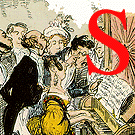 ay what you will, man is a pleasure-seeking animal.
This assertion must not be paraphrased to: man is a seeker
of animal pleasure. But there is in every temperament a
need [Drang] that cries out for pleasure. It may take a
good, or a bad, form, but man's will has been given him
to determine its proper course. A lady novelist once put
the question to me: "What do you consider the principal
thing man strives for in life?" I answered, "Pleasure."
"Then what do you consider the greatest, and most lasting,
pleasure?" I said, "Work." Work has been to me the
elixir of life: it has carried me through years of bad health,
through sorrows and trouble; and it has steadied me in
moments of unexpected success. I utter a platitude
when I say that work begets work, just as idleness
begets idleness. When once work has taken pleasurable
possession of the individual, greed follows, and cries out
for more. Greed is born of abnormal activity, and can
be met with in all kinds of mental and physical conditions.
But all this is temperamental; it may also be said that the
desire for work -- for production -- does not depend on
opportunity alone: the greedy worker makes the opportunity.
[136]
ay what you will, man is a pleasure-seeking animal.
This assertion must not be paraphrased to: man is a seeker
of animal pleasure. But there is in every temperament a
need [Drang] that cries out for pleasure. It may take a
good, or a bad, form, but man's will has been given him
to determine its proper course. A lady novelist once put
the question to me: "What do you consider the principal
thing man strives for in life?" I answered, "Pleasure."
"Then what do you consider the greatest, and most lasting,
pleasure?" I said, "Work." Work has been to me the
elixir of life: it has carried me through years of bad health,
through sorrows and trouble; and it has steadied me in
moments of unexpected success. I utter a platitude
when I say that work begets work, just as idleness
begets idleness. When once work has taken pleasurable
possession of the individual, greed follows, and cries out
for more. Greed is born of abnormal activity, and can
be met with in all kinds of mental and physical conditions.
But all this is temperamental; it may also be said that the
desire for work -- for production -- does not depend on
opportunity alone: the greedy worker makes the opportunity.
[136]
It may, or may not, be a virtue, but abnormal activity was born in me, and has constantly broken out in an inevitable greed for work; and there is no getting away from original idiosyncrasy. A writer once called me a "glutton for work," and I think he was pretty near the mark. Having such a temperament, I never hesitated to add labour to my already full life. . . . [139]
This was the period of my life when the work I imposed upon myself was so excessive that even greed could ask for no more. I worked at my portraits and subject-pictures, and I did etching as usual, considering these to be my first duty. But to this all-sufficient labour must be added the designing of details for my house, which was in course of erection; the preparation of lectures for Oxford, where I held the Slade Professorship ; the uninterrupted attendance at my school; the building-up of a stage-picture for the play; the writing of the music for the same; the irritating work of correcting the copied parts for the orchestra; and, finally, the most severe strain of all on the nerves -- the rehearsing of a new play. I leave it to the reader to judge if this was a normal state of things. Yet, during these months of excitement I was in good health, and retired to bed long after midnight without any feeling of fatigue. I had no assistance from stimulants, as I was a water- drinker and a non-smoker. But it was the result of the domination of mind over body for the time being -- a condition, however, that could not last. Nor did it; for I have since paid a heavy price for that pleasure-period in long years of bad health. [177]
Bibliography
von Herkomer, Sir Hubert. My School and My Gospel. New York: Doubleday, Page, and Co., 1906.
Last modified 30 May 2007